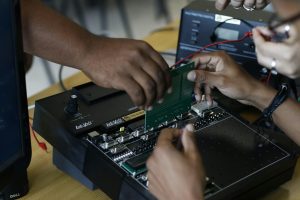Why Adaptive Learning Platforms Benefit Every Student Equally
In the ever-changing landscape of education, the traditional one-size-fits-all approach has proven to be ineffective for many students. Every student has a unique learning style, pace, and needs that cannot be met by a standardized approach. This is where adaptive learning platforms come in. These digital tools have gained popularity in recent years for their ability to personalize learning experiences for students. But what exactly are adaptive learning platforms and why are they beneficial for every student? In this article, we will delve into the world of adaptive learning and explore how it benefits every student equally.
The Concept of Adaptive Learning Platforms
Adaptive learning platforms are online tools that use data and algorithms to tailor instruction to individual students. As students interact with the platform, it collects data on their progress, strengths, and weaknesses. This data is then used to create personalized learning paths for each student. These platforms employ various techniques such as gamification, simulations, and interactive activities to engage students and keep them motivated.
The main goal of adaptive learning platforms is to provide a more efficient and effective learning experience for students by offering personalized instruction. They also aim to address one of the biggest challenges in education – the achievement gap. By catering to the unique needs of each student, adaptive learning platforms can help bridge the gap and provide equal opportunities for all students.
The Benefits of Adaptive Learning Platforms for Every Student
1. Personalized Learning Experience
The biggest advantage of adaptive learning platforms is their ability to provide a personalized learning experience for every student. By analyzing and understanding the needs of each student, these platforms can adjust their teaching methods, pace, and content to suit their individual learning styles. This means that students can learn at their own pace and in a way that makes sense to them, leading to a deeper understanding and retention of the material.
2. Catering to Different Learning Styles
Each student has a unique learning style, whether it be visual, auditory, or kinesthetic. Adaptive learning platforms can cater to all these learning styles through their use of various methods and activities. For visual learners, there are videos and graphics, for auditory learners, there are podcasts and lectures, and for kinesthetic learners, there are interactive activities and simulations. This ensures that all students, regardless of their preferred learning style, can benefit from the platform.
3. Encourages Self-Directed Learning
Another benefit of adaptive learning platforms is that they encourage self-directed learning. With a personalized learning path, students have more control over their learning, which leads to a sense of responsibility and ownership. This, in turn, can boost their motivation and engagement in the learning process.
4. Instant Feedback and Progress Tracking
Adaptive learning platforms provide instant feedback to students, allowing them to identify areas where they need to improve. This immediate feedback also helps students stay on track and make corrections in real-time. Furthermore, these platforms also track each student’s progress, which can be useful for both students and teachers in identifying areas of improvement and celebrating successes.
5. Bridges the Gap and Promotes Inclusivity
The biggest advantage of adaptive learning platforms is their ability to bridge the achievement gap and promote inclusivity. By catering to the unique needs of each student, these platforms can provide equal opportunities and access to quality education for all. This is especially beneficial for students who may be struggling in traditional classroom settings due to various reasons such as learning disabilities, language barriers, and socio-economic backgrounds.
The Future of Education Lies in Adaptivity
In a world where technology is rapidly advancing, it is evident that the future of education lies in adaptivity. With its ability to personalize learning experiences and promote inclusivity, adaptive learning platforms have the potential to revolutionize the way we teach and learn. As more and more students and schools adopt these digital tools, it is essential to continuously improve and innovate them to keep up with the ever-evolving needs of education.
In conclusion, adaptive learning platforms are a powerful tool that can benefit every student equally. By providing a personalized learning experience, catering to different learning styles, promoting self-directed learning, and bridging the achievement gap, these platforms have the potential to transform education for the better. As we move towards a more individualized and inclusive approach to education, it is safe to say that adaptivity is the key to the future of learning.










